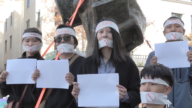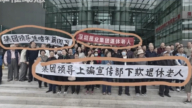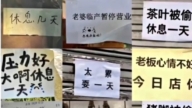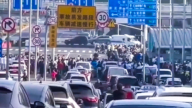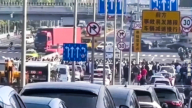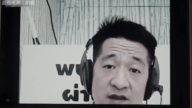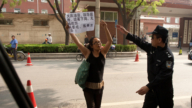【新唐人2013年05月16日訊】5月14號,大陸國務院新聞辦發表《2012年中國人權事業的進展》白皮書,白皮書從六個方面介紹中國過去一年推動人權的所謂成績。但多數律師認為,中國的人權狀況並沒有明顯改善,甚至倒退。
這份白皮書總長約2萬多字,從經濟、政治、文化、社會、生態文明及外部交流合作等6個方面,介紹了中國人權狀況的最新進展。
其中,白皮書以大量經濟數據強調人民生活水平不斷提高。但是大陸「東南大學」法學教授張讚寧表示,國民生產總值GDP提高,或人民的收入提高,與人權毫無關係。
張讚寧:「如果說給你飯吃、給你衣服穿,不至於餓死、凍死,這就是人權的話,這是很荒謬的。所以,人要講話、要有政治權利、要有信仰權,這是人區別於動物的最根本的地方。」
中國民主運動的標誌性人物魏京生也向《新唐人》表示,中國所謂富裕了,也只是部分人富裕了,還有相當多的中國人非常貧困。
魏京生:「按聯合國的貧困標準的話,中國至少還有兩三億人在貧困線以下,包括城市裡都有很多的貧民。現在東西那麼貴,然後他們一個月只能掙一兩千塊錢,大多數的勞動人民,包括中產階級下層,他看不起病,他上不起學,買不起房。甚至你看那有錢人都往外跑呢!你生活水平改善了,所謂有錢了,並不等於就是有了人權。」
北京律師江天勇從幾方面評估中國的人權狀況。
北京律師江天勇:「你可以看到,很多農民失去土地,很多城市的居民失去自己的房屋,到處都是強拆。人們為了保護自己的房屋不被強拆,各種各樣的抵抗,有自焚!也有農民因為保護自己的土地,被構陷判刑、被毆打! 」
另外,江天勇說,還有很多企業下崗的工人,他們下崗之後一無所有,還有,如三峽水庫等移民,他們因為生活沒有著落,到處上訪。而在司法方面,因為司法不公,人們難以通過司法救濟的途徑來維護自己的權利。
江天勇:「大量民眾到北京去上訪,但實際上,上訪很多被抓入黑監獄,遇到很多截訪的,經常看到人被打死的這樣的消息,很多信仰者被打壓,包括家庭教會、法輪功信仰者,尤其是法輪功信仰者。今年以來,抓了特別多—-東北,包括河北、河南…甚至雲南,大面積的抓人。我覺得這就是人權的災難。」
5月13號,十多位中國人權律師探訪四川省「成都資陽法制教育中心」,遭到當局人員毆打和非法拘押。江天勇認為,現在的公權力肆無忌憚,想打壓就打壓,這是國家在犯罪。
江天勇:「你比如今年二月份、三月份,北京還有廣東那邊,包括江西,有一些公民要求官員公示財產,他們舉牌要求公布,就被抓起來了,這個人被抓了之後,另外有律師去為他們辯護,去會見,當地的不讓會見,律師就被公然的毆打,律師的執業權沒有保障,公民的任何權利也沒有保障。」
人權進展白皮書在「政治建設中的人權保障」一章中,特別提到互聯網的平臺作用。白皮書聲稱,「互聯網已經成為公民實現知情權、參與權、表達權和監督權的重要渠道,成為政府了解社情民意的重要途徑。」
中國網友無憂:「在中國內地上網的人都會經歷審查無處不在、無時不在,任何時候都有可能因為涉及敏感的這些東西而被刪帖,或者,甚至被追究責任。整體來說,我覺得(人權)還是比較糟糕的。 」
根據這份人權進展白皮書,截至去年底,中國網絡微博用戶規模為3.09億。網民每天發表的論壇帖文和新聞評論達300多萬條,微博客每天發佈和轉發的信息超過2億條。
但有網友發帖問:怎麼沒有公布每天的刪貼和銷號的數據?
採訪/易如 編輯/周平 後製/黎安安
China’s Lawyers Refute Official White Paper
On 2012 Human Rights
On May 14th China’s State Council Information Office released
a white paper,"Progress in China’s Human Rights 2012″.
On six areas, the report related the official “achievements"
made in 2012 on China’s human rights situation.
However, many lawyers hold a contrary view. They think
China’s human rights situation has deteriorated.
The 20,000 plus worded white paper stated
the latest “progress"of China’s human rights.
It covered six aspects: economy, politics, culture,
society, ecological civilization and external exchanges.
The report highlighted China’s increase in living standards.
Zhang Zanning, professor of Law at Southeast University says
that growth in GDP or income is unrelated to human rights.
Zhang Zanning:"It’s ridiculous to define human rights as
offering food and clothing to prevent one’s death.
As a human being, a person has right to free speech,
political rights, and has right to choose his own faith.
This is the most essential difference
between human beings and animals."
Wei Jingsheng, iconic figure of China’s democracy movement,
says that only a part of Chinese people have become rich.
A considerable number of people are still living in poverty.
Wei Jingsheng: “Based on the UN poverty standard, China
still has at least 200-300 million people below the poverty line.
There are lots of poor people living in cities.
Now commodities in China are generally expensive.
They only make 1,000-2,000 yuan per month.
Most of salary people cannot afford to see doctors,
to go to school or buy homes.
Just look those rich Chinese, they have all emigrated abroad!
A better-off life or getting rich doesn’t equate to
having human rights."
Beijing lawyer Jiang Tianyong gives his assessment
on China’s human rights situation.
Jiang Tianyong:"In reality, numerous farmers have lost
their lands, and lots of urban residents have lost their houses.
Everywhere you can see forced demolitions.
People have resisted home demolitions in various ways,
including self-immolation!
Many farmers have been sentenced or beaten
just for protecting their own lands."
Jiang Tianyong adds that most laid-off workers
has nothing to live on.
The same situation is also facing immigrants, who moved
away for construction of the Three Gorges Dam project.
They lost their sources of stable income, and
have petitioned for years.
Also, unfair judiciary in China has made it hard for citizens to
seek judicial relief to protect themselves, says lawyer Jiang.
Jiang Tianyong:"Large numbers of people have
petitioned to central authorities in Beijing.
But as a result, lots of them have been detained in black jails.
The authorities have sent staff to locate and intercept
petitioners, and have beaten many to death.
Numerous people have been suppressed
for insisting on their faith.
They include Christian Family Church members and
especially, Falun Gong practitioners.
This year, the authorities have staged
massive nationwide arrests.
In the northeast, in Hebei, Henan, and even in Yunan.
I think these prove human rights disasters in China."
On May 13th a dozen or mpre Chinese human rights lawyers
visited detainees at Ziyang Legal Education Center.
This is a notorious official black jail located in Chengdu,
Sichuan province.
These lawyers were physically assaulted and
illegally detained by the guards.
Jiang Tianyong says that today in China, public power
has been rampantly abused to crack down on citizens.
He points out that this is a state crime.
Jiang Tianyong: “For example, in February and March,
some citizens in Beijing, Guangdong and Jiangxi
called for asset declaration by public officials.
They were arrested for holding placards in public.
After they were arrested, their lawyers were stopped
when going visit them and even beaten.
In China, there’s no security for lawyers to practice law,
and no protection exist for citizens’ civil rights."
The White Paper particularly mentioned
the role of the internet in China.
It alleged that"The internet has become an important
channel for citizens to exercise their right to know,
to participate, to express and to watchdog."
“The internet has also greatly served the government
to know about society and public opinion."
(Netizen, China) Wu You:"China’s netizens have all
experienced official censorship.
Any time your post may be removed for
probably involving any sensitive terms.
You may then be placed under criminal investigation.
Overall, I think human rights here is rather bad."
The report claimed that by the end of 2012, China’s weibo
(micro-blog) users have reached 309 million.
There were over 3 million online posts and commentaries daily.
Each day, more than 200 million weibo posts
were created and forwarded in China.
A netizen asked,"Why haven’t the authorities released data
on daily removal of online posts and netizens’accounts?"


